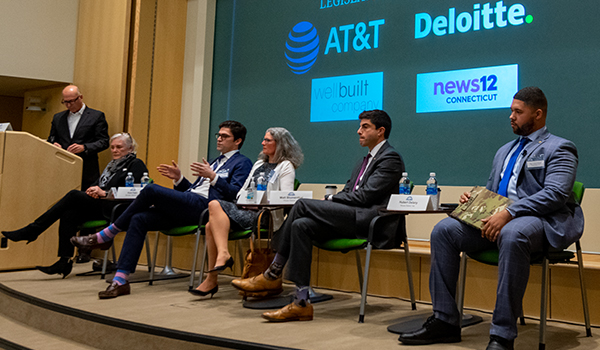Deloitte recently hosted the Stamford Chamber of Commerce”™s Legislative Breakfast in their Elm Street offices, enabling the city”™s business community to speak with a panel of local legislators on the state government”™s business-focused policies.
The panel was moderated by Harry Carey, who is both a director of the Stamford Chamber of Commerce and AT&T”™s director of external affairs. After making the introductions, Carey began the conversation about Connecticut”™s economic status by asking State Sen. Ryan Fazio ”” the panel”™s sole Republican lawmaker – about electric rates, noting that “it is not just a consumer issue, it”™s a business issue as well.”
“I think all members on the energy committee understand that the current rise in electricity rates is a disaster for Connecticut, and Connecticut”™s economy,” Fazio replied. “Connecticut historically was a major high tech manufacturing hub but with the high input cost from the rise in electricity rates, and the rates are the highest they”™ve been for a long time, that creates a major competitive disadvantage.”

Fazio noted that Connecticut lost manufacturing jobs at a higher rate over the past 15 years than the nation at large, and he touted a recent proposal to strip the state”™s share of fees and taxes out of electric bills, which he said would save the average household $250 annually. He also called for an “all of the above” approach to energy which would re-classify nuclear and hydroelectric energy as renewables for meeting clean energy standards, alongside constructing infrastructure to tap into Canadian hydroelectric and new natural gas pipelines.
Carey then asked State Rep. Rachel Khanna, a member of the House Transportation Committee, to weigh in on issues she sees having the largest impact on Stamford.
“The rail system is certainly one that we”™re looking at and I think really relevant to Stamford is traffic and pedestrian safety,” Khanna replied. “There have been a lot of issues with that in Stamford, but I think as our cities, which are thriving and are going to continue to thrive, we need to really focus on seriously addressing that issue. People who are coming and working in our cities want to feel safe and comfortable.”
Khanna noted that The New York Times recently named New Haven one of its “52 places to visit” and said that improving pedestrian access and safety could help Stamford make that list in the future.
Carey also put the question of Proposed Bill 6321 to the panel. The bill calls for the Department of Economic and Community Development to appropriate $58 million from the general fund for investment into arts, culture and tourism.
All of the elected officials agreed with the idea of the bill in principle, though each said they were not ready to cosign the proposed sum without further research.
State Rep. Matt Blumenthal ”” who is also the son of U.S. Sen. Richard Blumenthal ”” pointed out that none of them were familiar with the details of the bill due to the nature of the current legislative session.
“Every other session all legislators have the opportunity to propose their own individual bills,” Blumenthal said, “and the number that we propose collectively ranges from somewhere between 1,500 and 7,000, depending on the year. Not all of these bills get passed, not all of these bills get deeply considered by committees.”
Carey then asked Fazio specifically to address what he has heard in his position as a member of the Finance Committee.
“I think there”™s going to be a lot of action on the Finance Committee this term specifically,” Fazio replied. “There is an opportunity and willingness on both sides of the aisle to reexamine our income tax code in particular and potentially reduce income taxes in what is hopefully a significant way for the first time in the modern history of Connecticut.”
“Connecticut has the second highest taxes in the country and disproportionately that burden comes in the form of income taxes on the middle class,” Fazio added.
Saying that tax increases should be out of the question, Fazio explained that he has proposed a bill that calls for a progressive income tax cut which he hopes will cut the bills for middle class taxpayers by 2%. He also outlined hopes for removing the corporate surcharge, noting, “We need to be a more welcoming state to small businesses which employ a disproportionate amount of all the employees in Connecticut.”
Blumenthal concurred, saying “I was looking at a study recently that showed the difficulty in finding qualified and able employees is one of the biggest challenges for over 60% of businesses in Connecticut, and for 38% of businesses it is their number one barrier to growth. I think that means we have to focus on not only bringing people to the state but also training them for the jobs that already exist here.”
Blumenthal also explained that he believes his work as co-chairman of the Women”™s Reproductive Rights Office has implications for economic development as it both benefits existing families and makes the state attractive to workers from parts of the country limiting access to abortion.
“We want to continue to work to ensure, that we”™re not only one of the best, but the best place in the country to raise a family,” Blumenthal added.
State Sen. Ceci Maher emphasized the need for workforce development programs that clear the path for workers, especially in health care, to earn the certifications necessary to fully participate in and contribute to the economy.
The issue that prompted the most questions from the audience was housing.
Fazio said, “The best way to make sure housing is affordable is obviously to make sure that people have good jobs, and good wages as well as affordable housing.” He placed the emphasis for legislators on reducing the burdens of taxes, power bills and health care costs while respecting that different municipalities have “different needs.”
“It”™s not just about reducing taxes, it”™s about making things better for taxpayers,” countered Rep. Hubert Delaney. “We need to give people the ability to have more of their disposable income to spend on things besides housing.”
Delaney cited the CT Savings program and the state ban on captive audience meetings by employers to counter unionization efforts as legislation to build on towards that goal.
“I know that we”™re not going to necessarily have one single policy that”™s going to tackle and create more affordable housing. But I do think it”™s not just about building more affordable housing, it”™s about giving people more access to their income,” Delaney said.





















